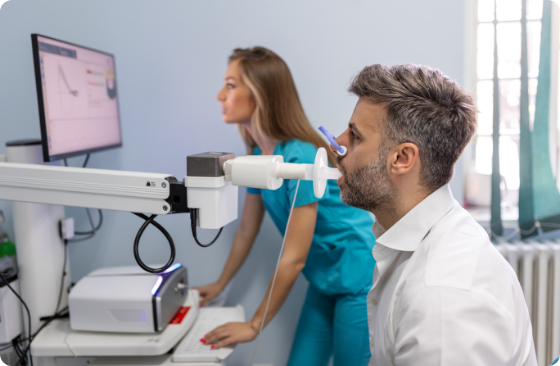what is a
spirometry test?
A spirometer test is a simple yet powerful diagnostic test that measures how well your lungs are functioning. It assesses the amount of air you can inhale, and exhale, and how quickly you can do so. It helps to measure your lung volume.
This non-invasive test provides valuable insights into your lung health, helping our physicians detect conditions like asthma, chronic obstructive pulmonary disease (COPD), and other respiratory issues.
what does a spirometer
test measure?
A Spirometer Test measures several key parameters:
Forced Vital
Capacity (FVC)
The maximum amount of air you can exhale forcefully after inhaling deeply.
Forced Expiratory
Volume in 1 second (FEV1)
The amount of air you can exhale forcefully in one second.
FEV1/FVC Ratio
This ratio helps assess airflow obstruction.
Who Is A Candidate For
A Spirometer Test?
If you’re experiencing symptoms like shortness of breath, wheezing, and coughing, or if you have a history of smoking, exposure to lung irritants, or a family history of respiratory conditions, you could benefit from a Spirometry Test.
Additionally, individuals with existing respiratory conditions like asthma, restrictive lung disease, obstructive lung disease, or COPD may also require regular Spirometry testing to monitor their lung function.
how is a spirometry test done?
During a Spirometer Test, you’ll be guided through a simple, painless process:
Preparation
You’ll be asked to sit comfortably and remove any tight clothing that might interfere with breathing.
Instructions
A trained technician will explain the procedure and demonstrate how to use the spirometer.


Deep Breath
During the spirometry breathing test, you’ll be asked to take a deep breath and exhale forcefully into the spirometer, ensuring complete exhalation.
Multiple Trials
The test may be repeated several times to ensure accuracy and consistency of results.
Analysis
Your results will be analyzed by our expert team, and you’ll receive personalized feedback and recommendations based on the findings.
understanding the results and
what happens next
After your Spirometry Test, our expert team at Cardiology Care will interpret the results and guide you through the next steps:
Result
AnalysisYour results will be analyzed to assess your lung function and identify any abnormalities.
Discussion
We’ll discuss the findings with you, explaining what they mean for your respiratory health.
Treatment Recommendations Based on the test results, we may recommend further diagnostic tests, lifestyle modifications, or treatment options.
Follow-up
PlanWe’ll outline a personalized follow-up plan to monitor your lung health and ensure optimal care.
why choose cardiology care for spirometry test?
At Cardiology Care, we prioritize your health and well-being – Here’s why we’re the best choice for your Spirometry Test:
Expertise
Our team of board-certified cardiologists and pulmonologists are highly skilled in performing and interpreting Spirometry tests.
State-of-the-Art Facility
We utilize the latest technology and equipment to ensure accurate and reliable results.


Comprehensive Care
Beyond spirometry breathing tests, we offer a full range of cardiovascular and respiratory services, providing holistic care under one roof.
Patient-Centered Approach
Your comfort and satisfaction are our top priorities. We strive to provide a seamless and compassionate patient experience from start to finish.
Don’t wait any longer to take control of your lung health – schedule your
Spirometry Test with Cardiology Care today and breathe easy.
Every beat matters and every breath counts at Cardiology Care!
Frequently Asked Questions
What is the purpose of spirometry testing?
Spirometry testing measures lung function, particularly the amount and speed of air you can inhale and exhale, to diagnose and monitor respiratory conditions.
Where can I get a spirometry test near me?
Anyone who’s searching “spirometry test near me”, while being located in or around the Manhattan area, has Cardiology Care as the perfect option to get their test done.
Why do I need lung function tests?
The lung function tests (also called pulmonary function tests) are needed to diagnose, monitor, and manage conditions like asthma, chronic obstructive pulmonary disease (COPD), and other respiratory issues.
When is a pulmonary function test required?
A pulmonary function test or lung function test is required if you have symptoms like chronic cough, shortness of breath, or wheezing, or to monitor existing lung conditions.
What not to do before pulmonary function tests?
Before a pulmonary function test, avoid smoking, consuming alcohol, heavy meals, and strenuous exercise for at least a few hours. Also, follow any specific instructions about medication use from your doctor.
How can chronic obstructive pulmonary disease be diagnosed?
Chronic obstructive pulmonary disease (COPD) is diagnosed through spirometry measures to assess airflow obstruction and confirmatory tests like chest X-rays to evaluate lung structure and rule out other conditions.
What is the cost of a spirometry test?
The spirometry test price can vary widely depending on the location and healthcare provider, but it typically ranges from $50 to $150 in the United States without insurance coverage.






